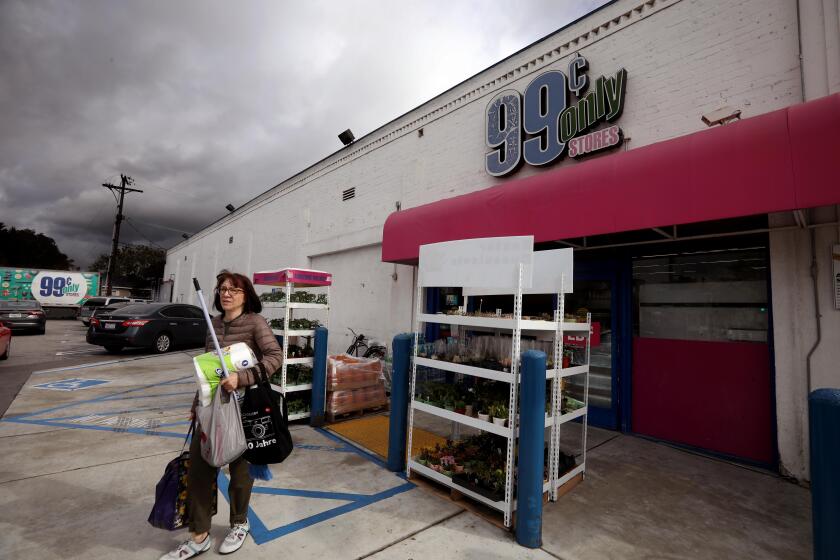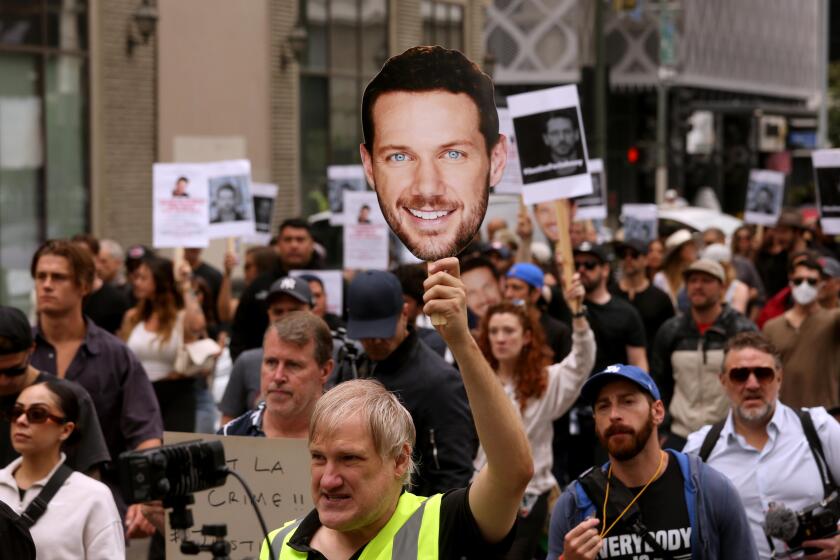Column: More than just a store, 99 Cents Only gave a fair shake to all who entered
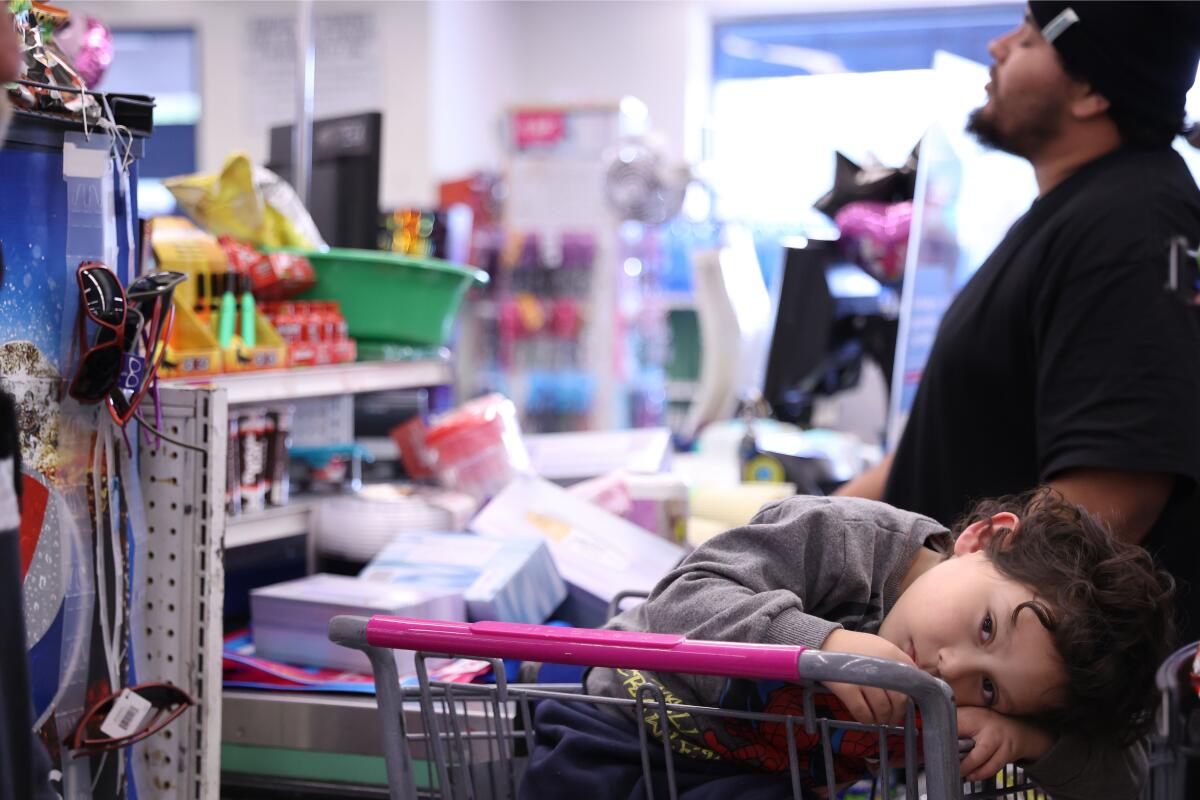
At 8:30 on Sunday morning, the parking lot at the 99 Cents Only store in Santa Ana was already beginning to fill. A few days earlier, the chain had announced it was closing all 371 of its stores in California, Nevada, Arizona and Texas.
This location off Main Street had seen better days. Unhoused people wandered near the trash bins. The walls and walkway leading to the front door were grimy. A massive window decal of fresh fruit near the entrance was peeling.
No one smiled while grabbing a shopping cart and walking in, even though all items were 10% off and signs screamed “Everything Must Go! Up to 30% Off.” Customers expressed their condolences to anyone with a name tag and vented to anyone who would listen.
“I blame [Gavin] Newsom,” said Rick Juarez, 53, referencing the California governor as he entered the store to stock up on batteries. He had shopped at this location for “at least” 20 years. “Too many taxes, too high the minimum wage. These companies just can’t compete, and so they have to close. And it’s poor people like us who end up suffering.”
Victor Barrios said he hopes the rumors of investors wanting to save the 99 Cents Only empire were true.
“This needs to stay open,” the 38-year-old delivery driver said. “I make OK money, and buying here helps me. But imagine if you’re on WIC? If you’re on Social Security? You need a place like this. Are people now supposed to go to Ralphs? Or Target? With what money?”
The City of Commerce deep-discount retailer, for years one of the few true “dollar” stores, calls it quits after more than four decades.
I can count on my hands the number of times I had previously shopped at 99 Cents Only, and maybe even on one hand — I’m more of a swap meet kind of guy. I’ve only gone with my wife, only to this location. But I had to visit out of respect — and sadness.
The 99 Cents Only Stores’ demise is another blow for the thrifters who make Southern California tick.
For generations, millions of us — immigrants, long-timers, working-class folks, or people who just want a good deal — have fueled an alternate economy far removed from fancy department and grocery stores. We patronize swap meets, Salvation Army stores, half-off warehouses and garage sales. Food comes from bartering with neighbors, or outlets like 99 Cents Only. My people inspired Carey McWilliams to half-jokingly call Los Angeles the “junkyard for a continent” in his 1946 masterpiece, “Southern California: An Island on the Land.”
Even today, as I make a good living and my wife runs her own restaurant, we live a penny-pinching life. A grocery splurge for us isn’t Whole Foods or Erewhon; it’s Trader Joe’s. I get my shirts and khakis at Marshalls or Ross Dress for Less, and guayaberas at the Anaheim Indoor Swap Meet or Olvera Street. The last time I spent more than $100 on an item of clothing was a black suit from Nordstrom for my mother’s funeral.
Those of us in this fellowship of frugality seek out bargains because we know that California’s booms inevitably end in bust. That’s what makes the imminent end of the 99 Cents Only empire — which started in Westchester in 1982 — so distressing.
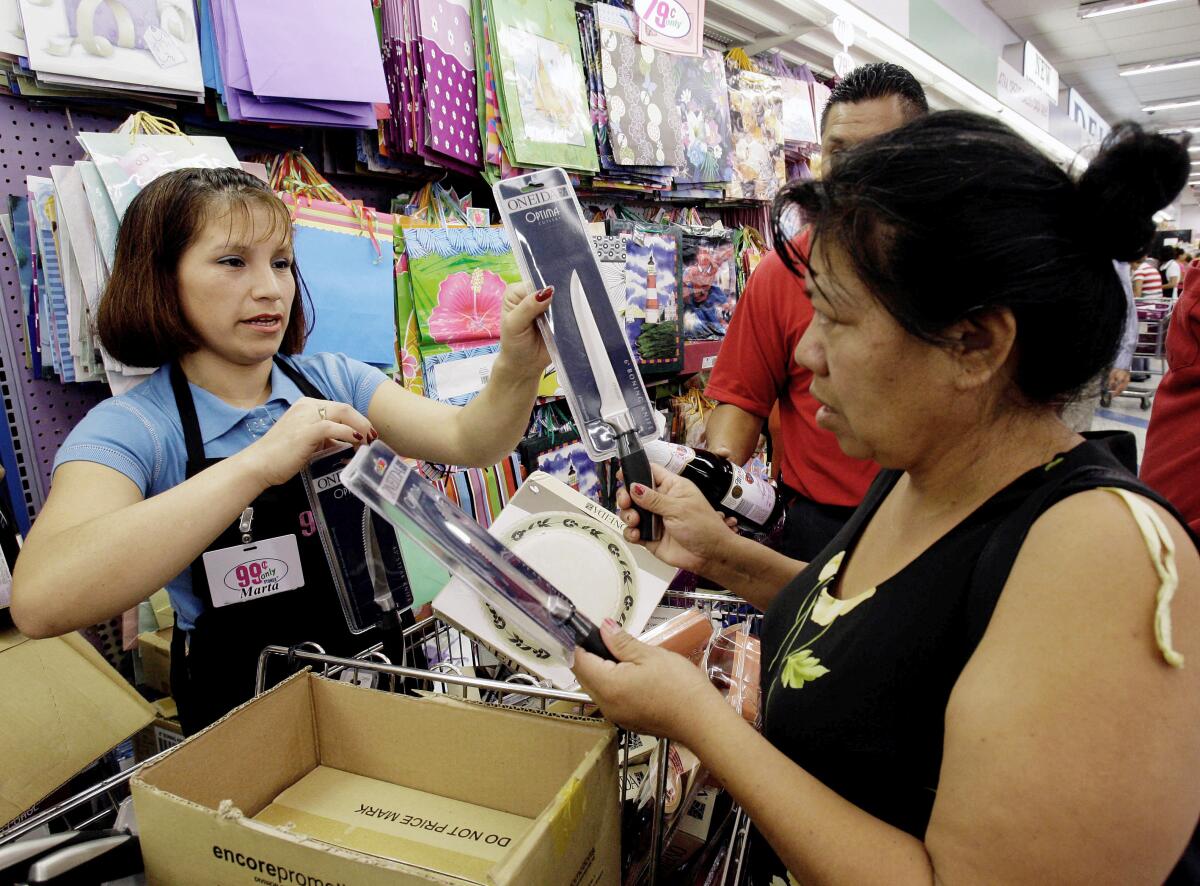
Interim Chief Executive Mike Simoncic said in a statement that the chain was closing because of “significant and lasting challenges in the retail environment.”
Even though it was a multibillion-dollar company, 99 Cents Only operated under a premise straight from the Great Depression: a fair shake for everyone who entered. Here, the retiree shopped alongside the hipster, and the only colors that mattered were the bright blue and pink on the marquee of each store. The chain had locations in blue-collar towns such as Santa Ana and Colton, but also suburbs such as Alhambra and Santa Monica.
Yes, off-brands and remaindered products made up the bulk of offerings, but treasures awaited for those who regularly came. One day, you’d get a generic brand of sriracha, another time, regular Tapatío hot sauce at prices you last saw during your childhood. And who knew when you might encounter a small blowup doll of AC/DC frontman Angus Young, like I did on Sunday?
There was a camaraderie among fans that rivals such as Dollar Tree or Dollar General or even Walmart were never able to match. Founder Dave Gold was a SoCal business iconoclast on the level of In-N-Out founder Harry Snyder and cafeteria magnate Clifford Clifton, who made sure that the least among us could eat and shop like kings.
Nowadays, discount shopping is just an Amazon click away — a race to the bottom of inferior products and loneliness.
“I could buy toys for my younger kids, my older kids could get pens for school, and I could do groceries for all of us,” Altagracia Nuñez told me in Spanish as she perused the beauty aisle, where sticks of men’s and women’s deodorant looked like tumbled dominoes. “And the prices, of course.”
She stayed quiet, then offered a weak laugh. “Well, everything is more expensive nowadays, so I guess this had to end.”
Friends told me that their local 99 Cents Only stores were beginning to look as bereft as the pandemic days. But the Santa Ana branch I visited was well stocked. It was interesting to see what was available and what wasn’t.
The shelves that once held reusable containers were empty, but the Easter decorations hadn’t moved. There were no more bleach bottles by LA’s Totally Awesome, but the rest of the brand’s cleaning products were available. Milk was sold out, but stacks of bland El Comal corn and flour tortillas — already marked 50% off — were barely touched.
Everyone’s shopping cart seemed fuller than usual, and they all seemed to have at least one package of both toilet paper and cleaning towels. I didn’t need either, or anything, really. So I bought an array of canned goods from a bygone era — Hormel canned tamales, Armour potted meat, Libby’s chicken Vienna sausages and pork luncheon meat, whatever on Earth that is — to mark the end of another Southern California classic.
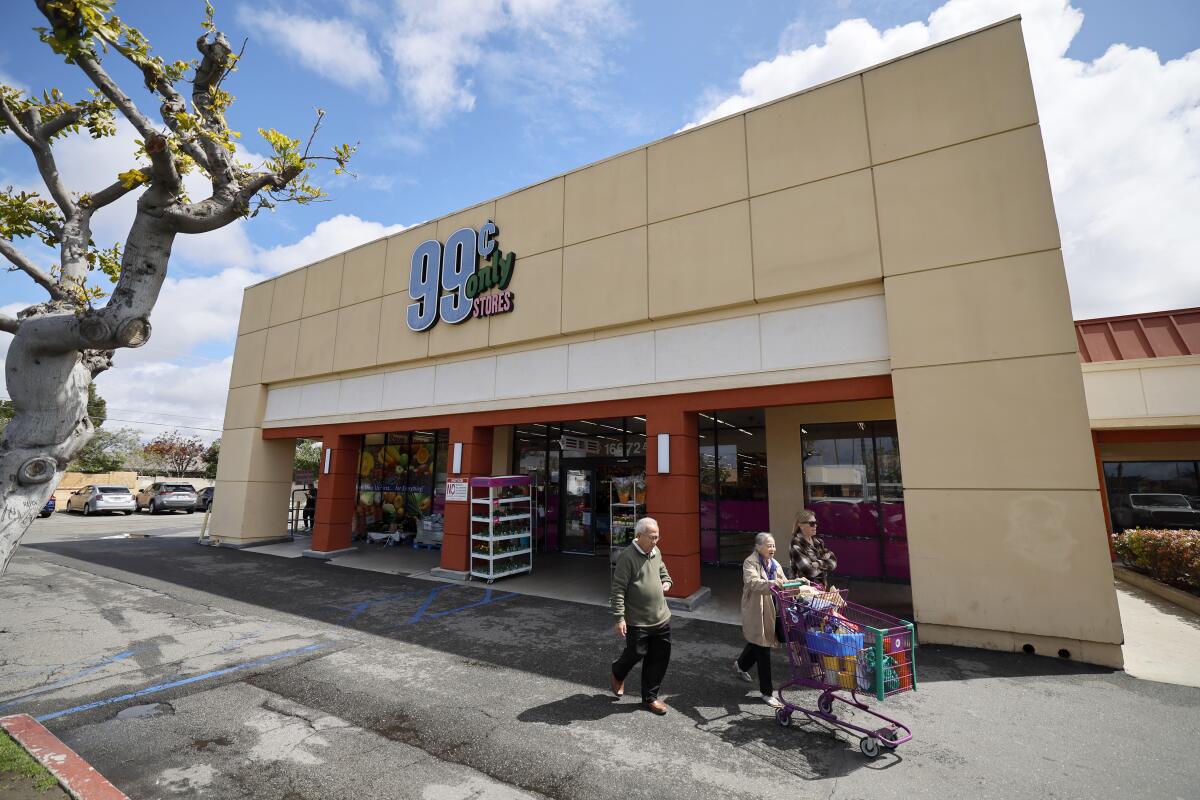
The Frito-Lay and Takis displays near the checkout counter were picked clean, as was the Pepsi cooler. Cheery new jack swing tunes played on invisible speakers. Behind me, a man softly sang to himself “Se va, se va la 99” (“It’s going, the 99 is going”). In front of me, a woman announced in Spanish to no one in particular, “I think I’ll come back here another time.”
“We close June 3,” the cashier responded. “Come back.”
He let a beat pass. “Come here until we’re done.”
More to Read
Sign up for Essential California
The most important California stories and recommendations in your inbox every morning.
You may occasionally receive promotional content from the Los Angeles Times.
